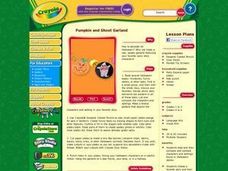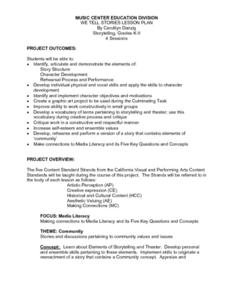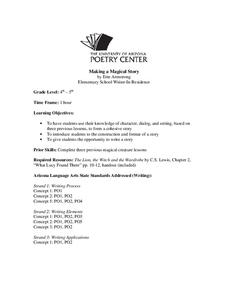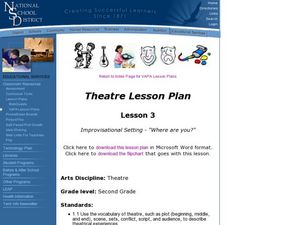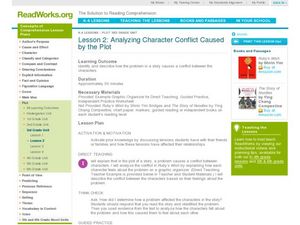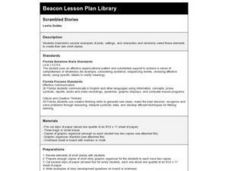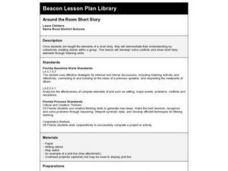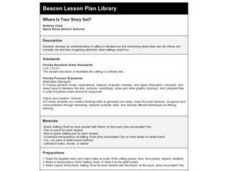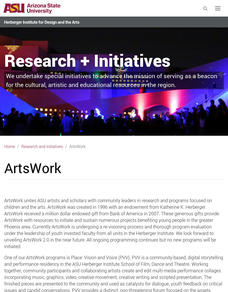Curated OER
Create a Playbill!
Seventh graders explore the various elements found in the advertisement of a dramatic experience. Playbills are created that reflect the plot without revealing the climax of the play. Costumes, set construction, and character description...
Curated OER
Chatty Cherry Stories
Young artists will respond to reading children's literature, by engaging in original storytelling and representing their own images through the visual arts. Then they orally describe details of people, places, and things in their stories...
Curated OER
Pumpkin and Ghost Garland
Reading scary stories on Halloween is frightfully good fun! As elementary learners read several stories for the holiday, they choose a favorite and create a decorative garland representing the characters and setting elements found...
Curated OER
We Tell Stories
Young readers bring characters to life by working in small groups to script and perform stories that contain a community concept. Detailed questions and activities are outlined for the class. Consider having your groups create...
Curated OER
Making a Magical Story
Fourth and fifth graders use their knowledge of developing character, dialogue, and setting to produce an original story. An excerpt from The Lion, The Witch, and The Wardrobe is used as inspiration to get everyone's...
Curated OER
Improvisational Setting - "Where are You?"
Second graders explore setting through improvisations. For this theatre lesson, 2nd graders perform a variety of improvisations in different settings and chart how they established the setting in the different environments.
Curated OER
Comparing Characters Across Two Short Stories
Ninth graders listen to a read aloud of two short stories focusing on literary devices. The write about the settings and realism of the stories, and decide each main character handles the conflict he faces with nature.
Curated OER
Analyzing Character Conflict Caused by the Plot
How do we know how a character was affected by the conflicts they encounter in a story? We use evidence from the text to make assertions about the characters we read about. Third graders practice finding and using evidence in a...
Curated OER
Scrambled Stories
Character development, setting, and plot? Sounds like the makings of a good narrative story. Young authors read and analyze several narrative examples, and then they use what they know to pen an original composition. They work both in...
Curated OER
Around the Room Short Story
Collective story writing is a great way to reinforce the concept of story elements and collaborative learning. Young writers discuss story elements such as, setting, character, action, climax, conclusion, foreshadowing, dialogue, and...
Curated OER
Introduction to Drama
Introduce your class to drama! You cast each pupil as a different character from a story you have read. They are given a general outline of the scene, act out the scene multiple times, then discuss the weak and strong aspects of each...
Curated OER
Novel Jeopardy
Play a classroom version of the classic game show Jeopardy, to review and discuss the novel your class has been reading. Questions about plot and other story elements are written on cards and given point values. Divide the class into...
Curated OER
Identifying Story Elements
Help your class identify story elements. They will discuss character, setting, problem, and solution after reading a story. A graphic organizer will help them to identify various elements with guided practice and independent practice...
Curated OER
Comparing Themes and Plots: "Young Goodman Brown" and "The Minister's Black Veil"
Students read two stories by Nathaniel Hawthorne and write an essay comparing plots and themes. In this Nathaniel Hawthorne short stories lesson, students read "Young Goodman Brown" and "The Minister's Black Veil." After a class...
Curated OER
Character's Qualities
Sixth graders analyze the a character's qualities and the effects of these qualities on the plot and the resolution of the conflict in the story "The Pigman and Me." They develop a list of the qualities, discuss if these qualities were...
Curated OER
Character and Plot Development Through Comics
Third graders are introduced to character, plot development, point of view, and tone through the use of comic strips. They, in pairs, identify these four attributes in the comic strip and present their findings to the class.
Curated OER
Where Is Your Story Set?
Students explore the concept of setting in literature by identifying their own current setting, and imagining what their ideal setting would be. They read a piece of literature, identify the setting and record the information on a chart.
Curated OER
Story Elements/ Setting
Students practice the story element of setting. In this setting lesson, students listen to the story Tulip Sees America by Cynthia Rylant. They discuss and describe the places that Tulip saw in the story.
Curated OER
Create - A - Story
Apply the elements of a story to create an original story. They select a character, setting, and plot out of a bag, and write an original story tying the three story elements together.
Curated OER
Lesson Plan 7: The Elements of Story
Budding novelists work on character development by relating to the characters in their stories. They imagine their own hopes and dreams and recall those of characters from books they've read. Learners also consider struggles the...
Curated OER
Narrative Nuts and Bolts
After viewing slides and reading about child labor, young authors compose an original narrative story. They practice note-taking skills and work to effectively engage a reader by incorporating plot, logical order, complex characters,...
Curated OER
Creating Plays from Children's Stories
Students explain how individual elements (e.g., plot, theme, character, conflict, etc.) comprise the structure of a play. They write an original one-act play with developed characters, specific setting, conflict, and resolution.
Curated OER
Puss in Boots/Jamil and the Clever Cat
Second graders read the story PUSS IN BOOTS identifying main characters, setting, and significant events. They then read the story JAMIL AND THE CLEVER CAT and compare it with the story PUSS IN BOOTS compiling a list of characters,...
Curated OER
Descriptive Writing-The Hobbit
Young readers write a descriptive paper on the fantasy characters in The Hobbit. They take notes as they read the novel in order to provide descriptions of the character traits of hobbits, dwarfs, trolls, wizards, and goblins. They...


